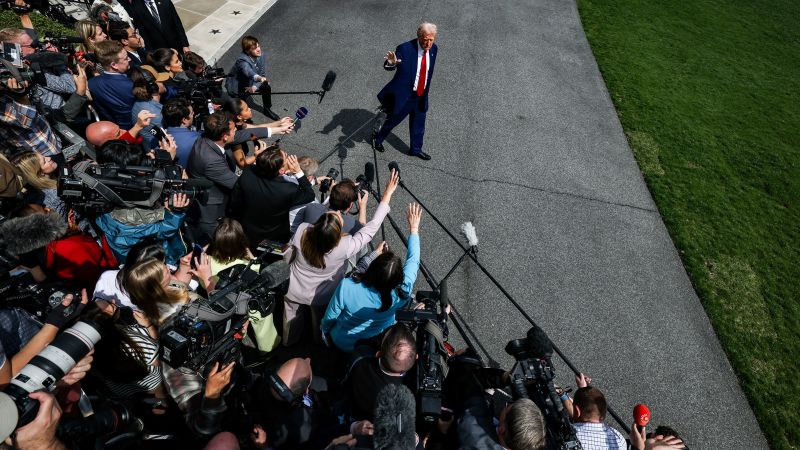
President Donald Trump is trying to recreate the US and its dominant position in the world as it was in the 50s, when the country was by far the greatest industrial power.In his speech imposing tariffs on friends and foes alike, he blamed the decline of manufacturing in the US on the failure of a succession of presidents to stand up for their country. He accused the rest of the world of “looting, pillaging, raping and plundering” the US through unfair trading practices.
To dramatise the point, Trump brought an auto worker and union member from Michigan to the podium to say how he had seen factory after factory close in his lifetime, and that this was all now going to change thanks to Trump.if(window.adverts) { window.

adverts.addToArray({"pos": "inread-hb-ros-inews"}); }The immediate certainty is an era of uncertainty for the entire world. Within hours of Trump moving to the brink of an international trade war, investors were rushing to buy so-called “haven assets” like gold and government bonds as the safest place to keep their money.
This uncertainty is all the greater because it is one more symptom of the deep fecklessness of the Trump administration, as it embarks on what Trump bills as “a historic moment” for the US. Supposedly, the new “reciprocal” tariffs are half as high as unfair tariffs and taxes levied on imports from the US by other nations. But in reality, they appear to be derived from simply calculating the American trade deficit with any state, designating that as all unfair, and then using half that figure to work out a new tariff.
This frightening mix of brutal power politics – telling states they must do things, however nonsensical, because Washington tells them to do so – and a fantastical detachment from reality are now combining to destabilise the entire globe.if(window.adverts) { window.
adverts.addToArray({"pos": "mpu_mobile_l1"}); }if(window.adverts) { window.
adverts.addToArray({"pos": "mpu_tablet_l1"}); }More immediately, how will Trump’s tariff war work as political leaders try to find the right balance between resistance and conciliation with which to cope with Trump? Many will make concessions in the hope that the White House will flaunt these as major victories and retreat, case by case, from the new tariff levels.Economists tend to be derisive about the idea that all this will lead to significant re-industrialisation in the US.
But in theory there is no reason why the US government might not, for example, pressurise and incentivise the US pharmaceutical industry to locate more plants in the US and fewer in Ireland. Trump mentioned the fact that a single Chinese shipyard now produces more ships than the whole US, and that something had to be done about this.But here the mercurial – or make-it-up-as-you-go-along – nature of the Trump government comes into play.
What company will want to make long term investment decisions involving, say, building a plant in Ohio or Wisconsin rather than Mexico or Canada, when relations between both countries and the US vary by the day? Most will react to the new uncertainty by waiting, not investing anywhere, and hoping for the smoke to clear.#color-context-related-article-3615613 {--inews-color-primary: #3759B7;--inews-color-secondary: #EFF2FA;--inews-color-tertiary: #3759B7;} Read Next square PATRICK COCKBURN Putin will escalate the war if he doesn't get what he wants from TrumpRead MoreThis may not happen any time soon. Trump is an expert on what is saleable to the American voter.
To them, the idea that they are being “ripped off” by the rest of the world has strong appeal. Trump and his officials continue to speak as if the new tariffs will be paid for by greedy foreigners enabling Americans to enjoy lower taxes, though they are in fact a sales tax imposed by the US government on its own citizens. Americans already pay an average of about $50,000 for a new car, and the tariffs may add $5,000 to $10,000 to the cost of each imported vehicle.
But the high cost is partly because US auto makers do not want to make smaller, cheaper cars where their profit is low. Using tariffs as a blunt instrument to bludgeon foreign governments and commercial companies to change the international economic balance of power is simply not going to work.But will American voters rise up against the vagaries of Trumpism, which will not be able to deliver on its promises, come the mid-term elections? In other words, is the best approach to Trumpism to wait for it to subside into ineffectiveness because of its own incompetence and general craziness? Several influential Democrats, such as President Bill Clinton’s former adviser, James Carville, have suggested that doing nothing is the best course.
The problem here is that since 2016, American political leaders and pundits have been waiting for Trump to self-destruct, but it has never happened. On the contrary, there he was in the White House Rose Garden on Tuesday laying down the law to the world with all the self-confidence of an irremovable dictator surrounded by cowed and craven courtiers.if(window.
adverts) { window.adverts.addToArray({"pos": "mpu_mobile_l2"}); }if(window.
adverts) { window.adverts.addToArray({"pos": "mpu_tablet_l2"}); }He has one further advantage: China, EU, Japan and other commercial powers want the world to stay as it is, while Trump wants to change it.
They do not want to overreact, and become complicit with him in capsizing the status quo. But they may end up having no choice but to fight back..














